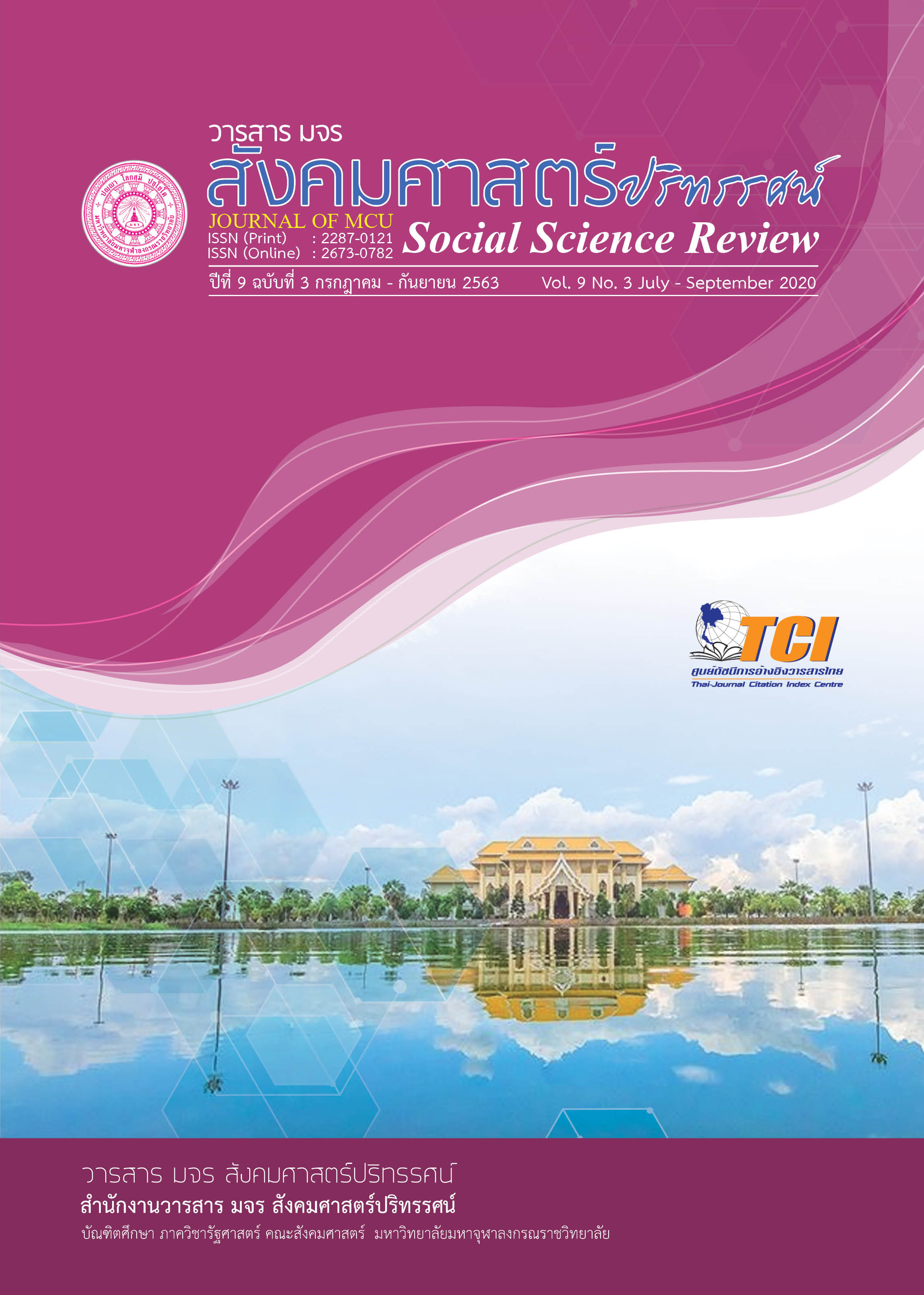ทิศทางภาครัฐกับการบูรณาการกลุ่มชาติพันธุ์ที่อาศัยอยู่ในราชอาณาจักรไทย
คำสำคัญ:
ภาครัฐ, การบริหารจัดการ, กลุ่มชาติพันธุ์ที่อาศัยอยู่ในราชอาณาจักรไทยบทคัดย่อ
บทความวิจัยนี้มีวัตถุประสงค์เพื่อศึกษาสภาพปัญหา ปัจจัยที่มีผล และแนวทางการกำหนดทิศทางของภาครัฐที่เกี่ยวข้องกับการบูรณาการกลุ่มชาติพันธุ์ที่อาศัยอยู่ในราชอาณาจักรไทย โดยการวิจัยในครั้งนี้เป็นการวิจัยเชิงคุณภาพ ใช้การวิเคราะห์ข้อมูลที่เป็นเอกสาร โดยผู้วิจัยได้ศึกษาและวิเคราะห์จากบทความ ตำรา วารสาร สื่อออนไลน์ และงานวิจัยที่เกี่ยวข้อง ผลการศึกษาพบว่า 1. ปัญหาเกิดจาก 1) การประกอบอาชีพการเกษตร ซึ่งเป็นอาชีพหลักดั้งเดิม 2) การเปลี่ยนแปลงโครงสร้างสังคมของกลุ่มชาติพันธุ์โดยสภาพสังคมเปลี่ยนเป็นสังคมเมืองมากขึ้นในหลาย ๆ พื้นที่ 3) แนวโน้มการเปลี่ยนแปลงสภาพภูมิอากาศ และ 4) การเปลี่ยนแปลงด้านการเมืองการปกครองระดับภูมิภาค 2. ปัจจัยของภาครัฐกับทิศทางการบูรณาการแผนชุมชนกลุ่มชาติพันธุ์ที่อาศัยอยู่ในราชอาณาจักรไทย ประกอบด้วย 1) ความเสี่ยงในฐานะกลุ่มชาติพันธุ์และชนเผ่าที่ไม่มีสถานะทางกฎหมาย 2) ความเสี่ยงจากการขาดสิทธิทางวัฒนธรรม และอคติทางชาติพันธุ์ และ 3) ความเสี่ยงจากการขาดสิทธิในทรัพยากร และความไม่มั่นคงทางเศรษฐกิจ และ 3. แนวทางการกำหนดทิศทางของภาครัฐที่เกี่ยวข้องกับการบูรณาการกลุ่มชาติพันธุ์ของภาครัฐคือ ภาครัฐปฏิบัติตามแนวยุทธศาสตร์ชาติ 20 ปี อันได้แก่ 1) ภาครัฐจะเร่งการส่งเสริมการยอมรับความหลากหลายที่มากขึ้นของชาติพันธุ์ ศาสนา และวิถีชีวิตทางวัฒนธรรมโดยไม่เลือกปฏิบัติ 2) ภาครัฐส่งเสริมความตระหนักในสิทธิมนุษยชน สร้างความเท่าเทียมกันในเรื่องสิทธิและศักดิ์ศรีความเป็นมนุษย์ในกลุ่มชาติพันธุ์ 3) ให้ความสำคัญกับองค์ความรู้และภูมิปัญญาของกลุ่มชน สร้างความภาคภูมิใจในรากเหง้าของคนในท้องถิ่น
เอกสารอ้างอิง
กรมคุ้มครองสิทธิและเสรีภาพ. (2556). สถานการณ์ทิศทางแผนสิทธิมนุษยชนแห่งชาติฉบับที่ 3 (พ.ศ. 2557-2561). สืบค้น 12 สิงหาคม 2562, จาก https://broadcast.nbtc.go.th/services/dwl.php?id=NTgwNDAwMDAwMDAx&file=ZGF0YS9kb2N1bWVudC9zZXJ2aWNlcy9kb2MvdGgvNTgwNDAwMDAwMDAxLnBkZg.
กรมองค์การระหว่างประเทศ กระทรวงการต่างประเทศ. (2558). สนธิสัญญาหลักด้านสิทธิมนุษยชน Core international human rights treaties สืบค้น 12 สิงหาคม 2562, จาก http://humanrights.mfa.go.th/th/humanrights/obligation/ international-human-rights-mechanism.
ฉัฐวัฒน์ ชัชณฐาภัฏฐ์. (2563). กลุ่มชาติพันธุ์ ความเหลื่อมล้ำของรัฐฉาน. วารสารสังคมศาสตร์และ มานุษยวิทยาเล่ม, 5(5), 143-157.
ชำนาญ จันทร์เรือง. (2560). สิทธิในการกำหนดอนาคตตนเอง. กรุงเทพธุรกิจ มีเดีย จำกัด. สืบค้น 12 สิงหาคม 2562, จากhttps://www.bangkokbiznews.com /blog/detail/641360
ดรุณี สิงห์พงไพร. (2559). การรวมเข้าและกีดกันในกระบวนการเปลี่ยนผ่านสู่การผลิตเชิงพาณิชย์: กรณีศึกษาชุมชนชาติพันธุ์ปกาเกอะญอ หมู่บ้านห้วยหอม จังหวัดแม่ฮ่องสอน. เชียงใหม่: มหาวิทยาลัยเชียงใหม่.
ไพสิฐ พาณิชย์กุล. (2560). รายงานเรื่อง สิทธิของชุมชนกะเหรี่ยง (ปกาเกอะญอ) กับการดำเนินเขตวัฒนธรรมพิเศษไร่หมุนเวียนในพื้นที่ยุทธศาสตร์การแก้ไขปัญหาข้อพิพาทกรณีที่ดินทำกินและที่อยู่อาศัยของชุมชนกะเหรี่ยงในพื้นที่ป่าภาคเหนือ. กรุงเทพฯ: สำนักงานคณะกรรมการสิทธิมนุษยชนแห่งชาติ.
รัตนา ด้วยดี. (2560). กระบวนการสร้างความทันสมัยของคริสตจักรม้งในเมืองเชียงใหม่. เชียงใหม่: มหาวิทยาลัยเชียงใหม่.
วสันต์ ปวนปันวงศ์. (2561). สิทธิการศึกษาของเด็กไร้สัญชาติ กรณีศึกษาโรงเรียนบ้านโป่งน้อย อำเภอเมือง จังหวัดเชียงใหม่. วารสารรัฐศาสตร์และรัฐประศาสนศาสตร์, 9(2), 123-156.
ศราวุธ ปทุมราช. (2555). ประเทศไทยกับการคุ้มครองสิทธิมนุษยชนชนเผ่าตามหลักสากล สิทธิชน เผ่าในประเทศไทย. มูลนิธิโครงการหลวง. สืบค้น 12 สิงหาคม 2562, จาก http://www.royalprojectthailand.com/node/1731
สารานุกรมไทยสำหรับเยาวชน. (2560). เรื่องที่ 5 กลุ่มชาติพันธุ์ ความหมายของกลุ่มชาติพันธุ์. สืบค้น 12 สิงหาคม 2562, จาก http://saranukromthai.or.th /sub/book/book.php?book=23&chap=5&page=t235infodetail01.html.
สำนักงานคณะกรรมการสิทธิมนุษยชนเเห่งชาติ. (2558). ความรู้ด้านสิทธิมนุษยชน. สืบค้น 12 สิงหาคม 2562, จาก http://www.nhrc.or.th/Human-Rights-Knowledge/International-Human-Rights-Affairs/International-Law-of-human-rights.aspx?lang=th-TH
สำนักงานเลขาธิการสภาผู้แทนราษฎร. (2560). สรุปสาระสำคัญของรัฐธรรมนูญแห่งราชอาณาจักรไทย พุทธศักราช 2560. สืบค้น 12 สิงหาคม 2562, จาก https://library2.parliament.go.th/ebook/content-ebbas/2560-bas.pdf.
เสาวภา อาศน์ศิลารัตน์. (2550). วัฒนธรรมการเร่ร่อนในทะเล, การเปลี่ยนแปลงอาณาเขต และการปรับตัว: การใช้ทรัพยากร และรูปแบบการบริโภคในหมู่เกาะตอนใต้ของประเทศไทย. กรุงเทพฯ: มหาวิทยาลัยมหิดล.
Shank, G.D. (2002). Qualitative Research: A Personal Skills Approach. Upper Saddle River, New Jersey: Pearson Education.
United Nations High Commissioner for Refugees. (2008). Statelessness. Analytical framework for prevention Reduction and coverage. Retrieved on August 12, 2019, from https://www.refworld.org /cgi-bin/texis/vtx/rwmain/opendocpdf.pdf?-reldoc=y&docid=4d78d3832.
United Nations. (2017). UN Declaration on Indigenous Peoples Rights. Retrieved on August 12, 2019, from https://www.un.org/esa/socdev/-unpfii/documents/DRIPS_Thai.pdf
ดาวน์โหลด
เผยแพร่แล้ว
รูปแบบการอ้างอิง
ฉบับ
ประเภทบทความ
สัญญาอนุญาต
ลิขสิทธิ์ (c) 2020 วารสาร มจร สังคมศาสตร์ปริทรรศน์

อนุญาตภายใต้เงื่อนไข Creative Commons Attribution-NonCommercial-NoDerivatives 4.0 International License.
เพื่อให้เป็นไปตามกฎหมายลิขสิทธิ์ ผู้นิพนธ์ทุกท่านต้องลงลายมือชื่อในแบบฟอร์มใบมอบลิขสิทธิ์บทความให้แก่วารสารฯ พร้อมกับบทความต้นฉบับที่ได้แก้ไขครั้งสุดท้าย นอกจากนี้ ผู้นิพนธ์ทุกท่านต้องยืนยันว่าบทความต้นฉบับที่ส่งมาตีพิมพ์นั้น ได้ส่งมาตีพิมพ์เฉพาะในวารสาร มจร สังคมศาสตร์ปริทรรศน์ เพียงแห่งเดียวเท่านั้น หากมีการใช้ภาพหรือตารางหรือเนื้อหาอื่นๆ ของผู้นิพนธ์อื่นที่ปรากฏในสิ่งตีพิมพ์อื่นมาแล้ว ผู้นิพนธ์ต้องขออนุญาตเจ้าของลิขสิทธิ์ก่อน พร้อมทั้งแสดงหนังสือที่ได้รับการยินยอมต่อบรรณาธิการ ก่อนที่บทความจะได้รับการตีพิมพ์ หากไม่เป็นไปตามข้อกำหนดเบื้องต้น ทางวารสารจะถอดบทความของท่านออกโดยไม่มีข้อยกเว้นใดๆ ทั้งสิ้น





